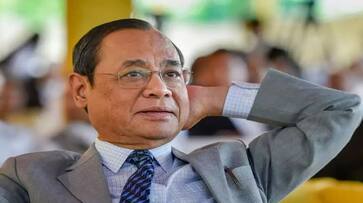Nominated Rajya Sabha member Ranjan Gogoi has said that he accepted the nomination to bridge the gap between legislature and judiciary and to build a strong nation.
Bengaluru: Former chief justice of India Ranjan Gogoi has been nominated to the Rajya Sabha.
The notification was issued on Monday. And as the news spread, there were a lot of talks that he was being rewarded his judgements (quid pro quo) as a judge and CJI.
While the talks still go on, Ranjan Gogoi has himself spoken about his appointment. As reported by ANI, he said, “I'll go to Delhi probably tomorrow. Let me first take the oath then I will speak in detail to the media that why I accepted this and why I am going to Rajya Sabha.”
Ranjan Gogoi was part of the bench that delivered verdicts of Rafale jet deal, reading down of article 370 and 35A and most importantly, the historic Ayodhya verdict in which the disputed land of 2.77 acres was given completely to Hindus as Muslims were given a 5-acre land in Ayodhya itself.
It is also interesting to know that it was Ranjan Gogoi who headed a team of dissenting Supreme Court judges against Gogoi’s predecessor Dipak Mishra.
At that time, Gogoi was hailed as the one who would safeguard democracy. But as he took over the reins of CJI, his attitude began to be under the lens as he, based on facts, delivered verdicts that happened to be on the government’s side.
At the time of writing this article, Republic TV quoted Gogoi as saying, “"My presence in Parliament will be an opportunity to project the views of the Judiciary before the legislature and vice versa. I have accepted the nomination to the Rajya Sabha because of a strong conviction that the legislature and judiciary must at some point work for nation-building.”
The President of India nominates 12 members to the Rajya Sabha for a six-year period.
It is done as a recognition of their contributions towards arts, literature, sciences, and social services. This right has been bestowed upon the President according to the Fourth Schedule (Articles 4(1) and 80(2)) of the Constitution of India.
Last Updated Mar 17, 2020, 6:45 PM IST









![Salman Khan sets stage on fire for Anant Ambani, Radhika Merchant pre-wedding festivities [WATCH] ATG](https://static-gi.asianetnews.com/images/01hr1hh8y86gvb4kbqgnyhc0w0/whatsapp-image-2024-03-03-at-12-24-37-pm_100x60xt.jpg)
![Pregnant Deepika Padukone dances with Ranveer Singh at Anant Ambani, Radhika Merchant pre-wedding bash [WATCH] ATG](https://static-gi.asianetnews.com/images/01hr1ffyd3nzqzgm6ba0k87vr8/whatsapp-image-2024-03-03-at-11-45-35-am_100x60xt.jpg)


